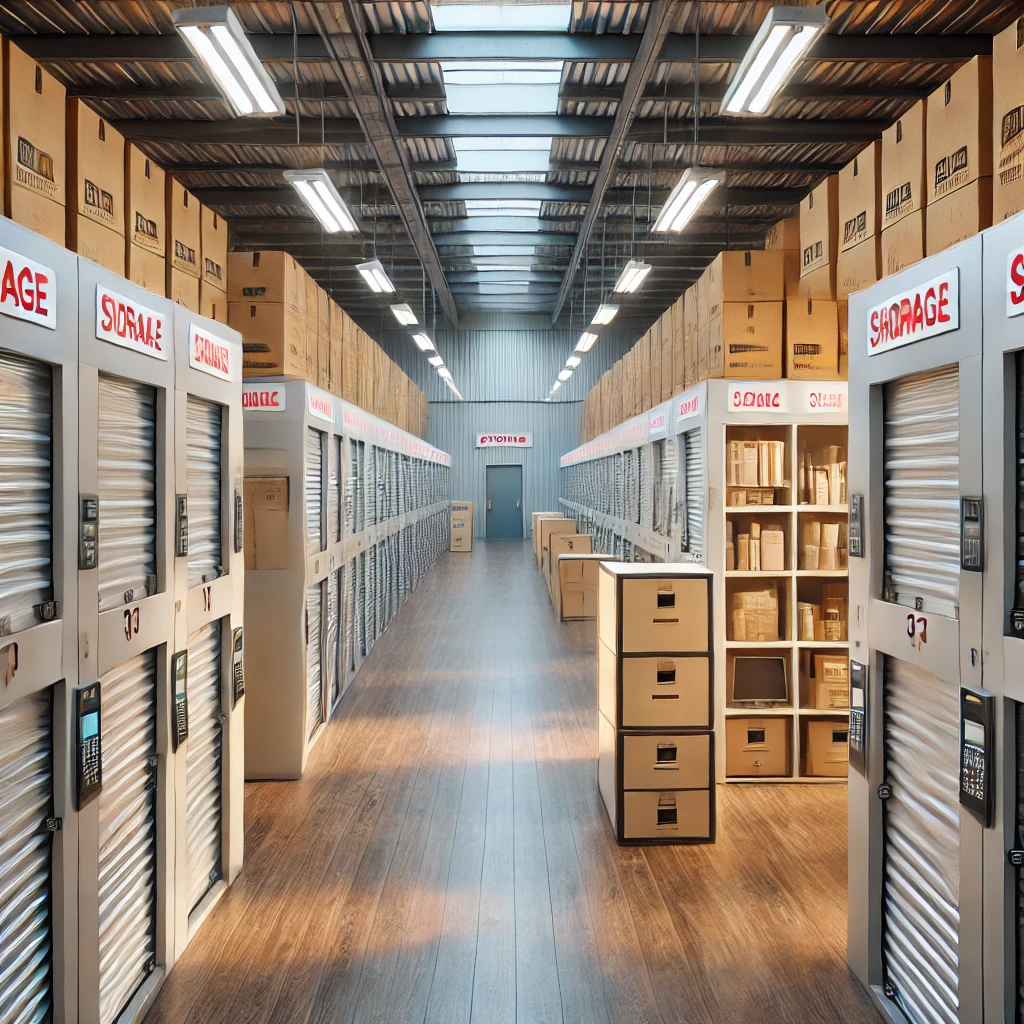 Content Gap Analysis – Find What Competitors Are Missing!
Content Gap Analysis – Find What Competitors Are Missing!
How to Manage Business Overflow Inventory
Written by SelfStorageDubai » Updated on: June 17th, 2025

Overflow inventory is a common challenge for businesses across various industries. Whether it’s due to seasonal fluctuations, unexpected demand, or inefficient inventory forecasting, excess stock can lead to storage issues, increased costs, and operational inefficiencies. Effectively managing this surplus stock is crucial for maintaining smooth operations, optimizing storage space, and ensuring that capital isn’t unnecessarily tied up in inventory.
In this guide, we’ll explore the best strategies for managing business overflow inventory and how leveraging business storage Dubai can streamline the process, providing cost-effective and efficient solutions.
Introduction to Managing Business Overflow Inventory
Overflow inventory is a situation in which a business has more products than it can store or sell in a reasonable time frame. It can occur for various reasons such as over-ordering, a surge in demand, or a lack of proper inventory control systems. Regardless of the cause, managing overflow inventory effectively is essential to prevent space shortages, wasted resources, and unnecessary financial strain.
Without effective management, overflow inventory can quickly become a logistical nightmare. For businesses in Dubai, where space can be limited and expensive, business storage Dubai services can provide an excellent solution. These storage solutions can help businesses organize their overflow stock, freeing up valuable space for other important activities while reducing the risk of unnecessary losses.
Identifying the Causes of Overflow Inventory
Understanding the root causes of overflow inventory is essential for effectively managing it and preventing it in the future. There are several key factors that can contribute to excess stock:
Seasonal Demand Spikes: Many businesses experience periods of high demand for specific products, especially around holidays or special events. In these cases, businesses may purchase more inventory than they can sell in the short term. While the demand surge might justify the excess stock temporarily, it can lead to overflow once the demand subsides.
Supply Chain Disruptions: Disruptions in the supply chain, such as delays in shipments, manufacturing issues, or transportation challenges, can lead to excess inventory. In an attempt to avoid stockouts, businesses may over-order, resulting in more stock than needed once the supply chain returns to normal.
Over-Ordering and Poor Forecasting: A lack of accurate demand forecasting or over-estimation of sales needs can lead to businesses ordering more stock than they actually need. Without an efficient system to track sales trends and inventory levels, this can quickly result in surplus stock that takes up valuable storage space.
Identifying these causes will allow businesses to implement more effective inventory control systems to minimize overflow. Utilizing business storage Dubai solutions can help accommodate excess inventory in an organized and efficient manner, ensuring that space is optimally used while managing the stock.
Evaluating Current Inventory Levels
Regularly evaluating inventory levels is crucial for businesses to determine the amount of overflow they are managing. This evaluation should be conducted periodically and involve the use of tools and techniques such as:
Inventory Audits: An inventory audit involves physically counting and verifying the current stock against the records in your system. Regular audits allow businesses to identify discrepancies, slow-moving items, and potential surplus stock. It also provides an opportunity to assess if storage space is being used efficiently.
Inventory Management Software: The use of inventory management software can help businesses track inventory levels in real time. With features such as automatic stock updates, reorder alerts, and demand forecasting, businesses can make informed decisions about their inventory and avoid overstocking.
ABC Analysis: ABC analysis categorizes inventory based on the items' value and sales volume. A products' classification (A for high-value, B for moderate-value, and C for low-value) can help businesses prioritize storage for high-demand items, reducing the chances of overflow in the most critical areas.
Evaluating inventory levels not only helps businesses understand their current stock situation but also highlights areas that require adjustment. For businesses in Dubai, integrating business storage Dubai services into the evaluation process can provide additional storage space when needed, allowing for the organization of surplus inventory until it’s needed.
Implementing Inventory Control Systems
Having a robust inventory control system in place is one of the most effective ways to manage overflow inventory. These systems help businesses track inventory levels, monitor sales trends, and manage stock replenishment in real time. Some key systems to consider include:
Barcode and RFID Technology: These technologies make it easier to track inventory with precision. By scanning products as they are received or shipped, businesses can maintain real-time visibility of stock levels and ensure that overflow inventory is identified and managed accordingly.
Inventory Management Software: Advanced software tools automate many of the processes related to inventory control, including stock tracking, ordering, and forecasting. These systems can alert businesses when they need to restock, and they can help prevent overstocking by providing data-driven insights into sales patterns.
Manual Systems: For smaller businesses, manual inventory tracking might be sufficient. This system involves physically counting stock and manually updating inventory levels. While it is less efficient than automated systems, it can still work for smaller operations.
By implementing an efficient inventory control system, businesses can reduce the chances of overflow inventory and ensure better space utilization. For those in Dubai, business storage Dubai services can offer flexible storage options when an overflow occurs, ensuring that excess stock is properly organized without disrupting regular operations.
Using a Just-in-Time (JIT) Inventory Strategy
A Just-in-Time (JIT) inventory strategy is designed to minimize the amount of stock a business holds at any given time. JIT focuses on ordering inventory only when it is needed, which reduces the chances of excess stock piling up.
Here are the benefits of adopting a JIT strategy:
Reduced Overhead Costs: With less inventory on hand, businesses can reduce the cost of storage, which includes rent, insurance, and maintenance.
Efficient Use of Storage Space: JIT helps businesses store only the essential stock they need for their operations, allowing them to utilize their storage space more effectively. This is especially beneficial for businesses in Dubai, where storage space can be expensive and limited.
Improved Cash Flow: By reducing the amount of capital tied up in unsold inventory, businesses can free up resources for other investments or expansion opportunities.
Integrating business storage Dubai into a JIT strategy can further streamline inventory management. Temporary storage solutions can be used to store surplus stock until it’s needed, preventing unnecessary accumulation while avoiding stockouts.
Adopting a First-In, First-Out (FIFO) System
A FIFO (First-In, First-Out) system ensures that older inventory is sold or used before newer stock. This method helps businesses prevent products from becoming obsolete, particularly if they are perishable goods or have expiration dates.
Benefits of FIFO include:
Minimized Waste: By using the older inventory first, businesses can prevent stock from expiring or becoming unsellable. This is especially important in industries such as food, pharmaceuticals, and cosmetics.
Improved Inventory Rotation: FIFO ensures that inventory is rotated regularly, helping businesses avoid the issue of holding onto stock that’s no longer in demand.
Cost Efficiency: By preventing waste and product obsolescence, FIFO can help businesses save money on unsold products.
Integrating FIFO with business storage Dubai services allows businesses to manage their stock efficiently and ensure that older items are used or sold first, preventing overflow and keeping inventory levels balanced.
Utilizing Business Storage Solutions for Overflow Inventory
When overflow inventory becomes inevitable, it’s important to have access to flexible and reliable storage solutions. Business storage Dubai services offer a variety of options that can help businesses manage excess inventory:
Self-Storage Units: These units are secure and affordable, allowing businesses to store excess inventory and access it as needed. Businesses can rent small or large units based on the amount of overflow inventory they have.
Warehouse Storage: For larger quantities of inventory, warehouse storage solutions provide ample space for storing excess stock. Warehouses typically offer a range of options, including temperature-controlled units and pallet storage for bulky items.
Mobile Storage: Mobile storage units are a convenient option for businesses that need temporary storage or require easy access to their stock. These units can be placed on-site or in off-site locations.
Leveraging business storage Dubai services allows businesses to store surplus inventory efficiently while keeping their primary operations unaffected. These storage solutions can be tailored to specific needs, providing businesses with the flexibility to scale their storage space based on demand.
Analyzing Sales Data to Predict Inventory Needs
Accurate sales forecasting is essential for avoiding inventory overflow. By analyzing historical sales data, businesses can predict future demand and adjust inventory levels accordingly. This data-driven approach helps businesses minimize the risk of overstocking and ensures that only the necessary stock is ordered.
Key benefits of sales data analysis include:
Accurate Demand Forecasting: Understanding historical trends helps businesses predict which products are likely to see a rise in demand and which ones might slow down.
Better Stock Replenishment: With accurate sales data, businesses can replenish stock before it runs low, reducing the chances of both stockouts and overstocking.
Increased Efficiency: By optimizing the ordering process, businesses can ensure that inventory is replenished only when necessary, reducing the chances of overflow.
Integrating business storage Dubai with sales forecasting can help businesses maintain an optimal amount of inventory in-house and manage overflow stock when necessary.
Selling Off Excess Inventory with Promotions or Discounts
When faced with excess inventory, businesses can quickly reduce stock levels by selling off products through promotions or discounts. This approach not only helps clear out surplus stock but also drives sales and attracts customers.
How to Liquidate Excess Inventory Quickly
One of the quickest ways to liquidate excess inventory is through flash sales, limited-time offers, or clearance events. Businesses can promote these sales through email campaigns, social media, and website banners to encourage customers to make quick purchases. Partnering with third-party sellers or online marketplaces can also provide additional channels to sell off excess stock.
Using Sales, Clearance Events, or Online Marketplaces
Sales events like "Black Friday" or "Seasonal Clearance" provide opportunities to discount inventory and clear out products that are taking up valuable space. Online marketplaces such as Amazon, eBay, or Alibaba can also serve as platforms for businesses to offload excess inventory to a global audience.
Repurposing or Recycling Overflow Inventory
Repurposing or recycling unsold products can help businesses minimize waste and reduce environmental impact while recouping some of their costs.
Options for Repurposing Unsold Products
If certain inventory items are no longer in demand, businesses can consider repurposing them for other uses. For example, unsold raw materials can be used to create new products, or excess clothing items could be donated or upcycled into new designs. Repurposing items not only reduces waste but can also be a cost-effective way to breathe new life into unsold stock.
Environmental Benefits of Recycling Overflow Stock
Recycling overflow stock can also have significant environmental benefits. Products that can’t be repurposed can be recycled to reduce landfill waste. By partnering with recycling programs or companies that specialize in product disposal, businesses can ensure that their surplus inventory is disposed of in an eco-friendly manner.
Regular Inventory Audits to Prevent Future Overflow
Regular inventory audits are essential for maintaining an accurate record of stock levels and preventing future overflow. By conducting these audits frequently, businesses can identify discrepancies early and take corrective action.
Importance of Conducting Regular Inventory Checks
Inventory audits help businesses ensure that stock levels align with what’s recorded in the inventory management system. Regular audits can help businesses identify slow-moving products, discrepancies, and overstocked items, allowing them to take proactive measures before overflow inventory becomes an issue.
Best Practices for Inventory Audits
Best practices for inventory audits include conducting both scheduled and unscheduled audits, involving multiple team members in the audit process, and using barcoding or RFID systems to ensure accurate tracking. Businesses should also maintain clear documentation and continuously update inventory records based on audit findings.
Educating Employees on Inventory Management
Training staff on proper inventory management techniques ensures that everyone understands how to handle and organize overflow inventory efficiently. This training should cover topics such as stock rotation, inventory labeling, and the importance of maintaining accurate records.
Training on Proper Storage, Stock Rotation, and Labeling
Employees should be educated on the importance of stock rotation methods like FIFO (First-In, First-Out) and how to properly label inventory for easy identification. This ensures that older stock is used first and that overflow inventory is easily accessible without causing delays or confusion.
Developing a Contingency Plan for Overflow Inventory
Unexpected surpluses of inventory can arise at any time. Developing a contingency plan for overflow inventory ensures that businesses are prepared to manage surplus stock effectively.
Creating a Strategy for Handling Unexpected Inventory Surpluses
A contingency plan should outline clear steps for handling unexpected inventory surpluses, such as identifying alternative storage options, implementing discounting strategies, and outsourcing excess stock to third-party providers.
The Importance of Flexibility in Inventory Management
Flexibility is essential in inventory management. A solid contingency plan should be adaptable to various scenarios, such as sudden demand spikes, supply chain disruptions, or unforeseen excess stock. Having a flexible strategy ensures that businesses can respond quickly and minimize the impact of overflow inventory on operations.
Conclusion: Effective Strategies for Long-Term Overflow Inventory Management
Overflow inventory doesn’t have to be a burden for businesses. By understanding the causes, implementing effective inventory control systems, and using business storage Dubai services, businesses can manage their excess stock more efficiently. Regular evaluations, advanced inventory management tools, and strategic planning are all essential components of a successful inventory management strategy.
By adopting these practices, businesses can not only manage overflow inventory but also optimize their storage and operational efficiency, leading to reduced costs and improved cash flow.
Website Url: https://selfstoragedubai.com/
Note: IndiBlogHub features both user-submitted and editorial content. We do not verify third-party contributions. Read our Disclaimer and Privacy Policyfor details.
Copyright © 2019-2025 IndiBlogHub.com. All rights reserved. Hosted on DigitalOcean for fast, reliable performance.
















